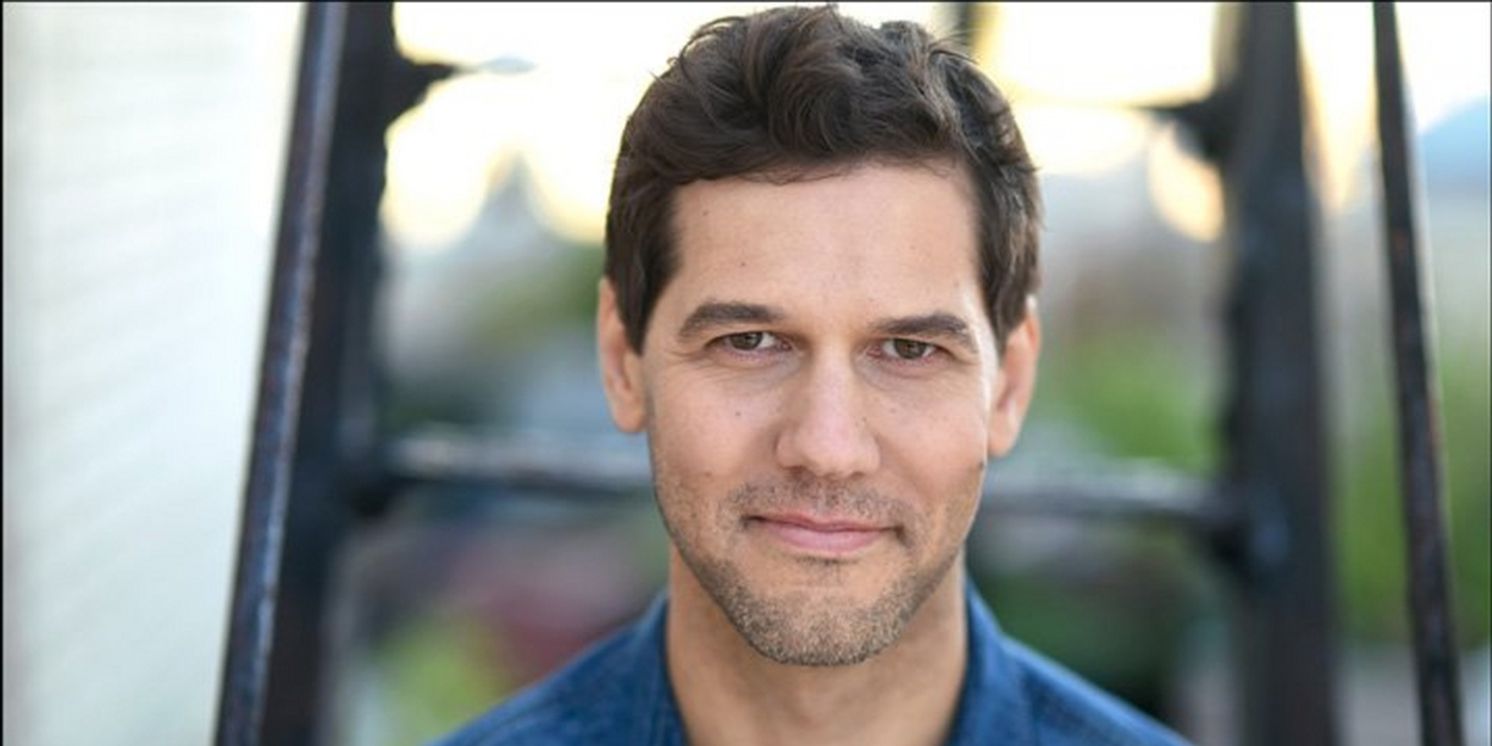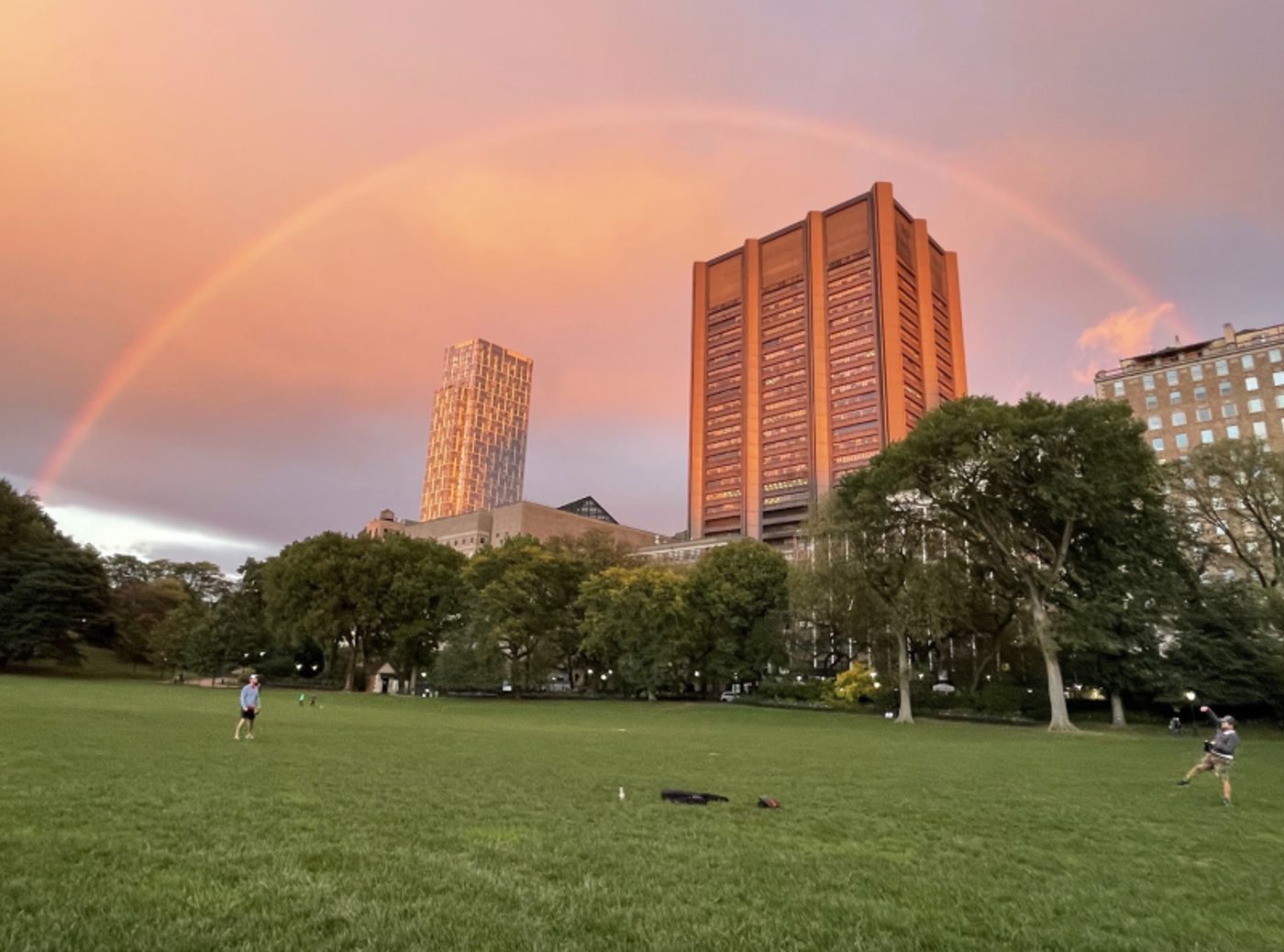Interview: Richard Hollman Talks BACK AND FORTH
Audience members will experience the play in Central Park's East Meadow, while listening via headphones to observe and eavesdrop the characters' conversation.

After a run in October 2021, Richard Hollman's Back and Forth has returned to Central Park for performances through July 23, 2023.
Performed in Central Park's East Meadow, BACK AND FORTH follows two long-time friends, Marty and Drew as they reunite for their first in-person game of catch since the pandemic. While one friend is eager to pick up the friendship right where they left off, the other has a secret he's dreading sharing.
Audience members will experience the play via headphones to observe and eavesdrop on Marty and Drew from 100 feet away.
BACK AND FORTH is written by Richard Hollman and directed by Katie Young. The cast is Chris Roberti and Richard Hollman, with stage management by Tamar Friedman, sound design by Jennie Gorn, and artwork adapted from Tamsi New. BACK AND FORTH is produced by Jeffrey Hollman.
Audience members will receive an email 24 hours before their performance telling them where to enter the park and how to recognize the house manager, who will advise them on how to tune in to the show and where they may want to sit.
Tickets are $25 and are on sale now at BackandForthPlay.com.
BroadwayWorld spoke with Richard Hollman about the inspiration for the play, what audience members can expect and more.
Can you tell me what inspired you to write Back and Forth?
I’ve lived in New York now for 24 years, and in that time, a lot of people that I’ve been very close to moved away. My parents got married in their early 20s, and they settled down, and there are so many people from my generation in the arts where moving up some kind of professional ladder is way less of a protocol, way less predictable, so your friends become your second family. But they’re not your real family in the sense that certain kinds of decisions you’re not included in.
I had a few friends in particular who moved to LA in a time when I think I was feeling very lonely after a breakup, and I was just shocked to find out. I knew so much about them, and we were so in tune with each other’s day to day lives, and then all of a sudden they tell me they’re moving to LA, and it was really difficult. There is this completely irrational, but momentary feeling almost like betrayal, where you’re like, “I thought we were going to do this all together.”
And then on top of that, I think the pandemic created almost a rash of those kinds of things, where people, for a lot of different reasons, were changing jobs, moving in and out of the city, ending relationships, things like that. And all of a sudden, the way you map your social world in your mind just changed. And that is a little bit of the story between the two characters. They’ve come out of the pandemic lockdown, they haven’t seen each other in person in a year and a half, and one is very excited to return to their old dynamic, and the other has news.
The other thing is that I played baseball growing up, I played a couple JV seasons in college, I love baseball. And I love that the physical difference can mirror emotional distance, and I really wanted to play with that with the play, with two guys relating to each other by talking, joking around, and by throwing a ball back and forth. At times we are, in the play, very far from each other and very far from the audience, hundreds of feet, and other times we’re close.
I got Covid very early in the pandemic, in March of 2020. And then it turned to long Covid and I had a year-plus long recovery. It was a lot of pain, a lot of breathing issues, and when I started to feel better, it didn’t feel safe to go back into a theater or a rehearsal studio, and I’m sure you remember when shows first started they were closing down all the time because of cast and crew Covid. So, I really wanted to see if this idea would work because I wanted to keep performing, and I wanted to be outside, essentially. A really nice thing that’s come of it is we’ve offered lots of comps to long Covid groups, one of which I’ve been a part of for a few years, and others I discovered while doing this. And it’s been a really warm reception.

How does it feel for you as a performer to be watched in this way rather than in a traditional theatre setting?
I love it, because everything about the circumstances reinforces the reality to us. We’re two guys having a catch in the park. So everybody around us and the entire park itself just reinforces the idea that these are two friends meeting in the park. It’s fantastic.
One odd thing is that there are funny moments in the play, and sometimes people will say later that it was funny, but we can’t hear them laugh. And part of that is that we are far from them. But another part of that is laughter is a group, social phenomenon, and they’re all wearing earphones, so I think they feel a little isolated. If you and I were sitting in a room and I put on a speaker, we’re listening to it together, but if we were listening to the same song with earphones in, it would not feel as together. And I think that’s something that happens.
Overall it’s great. We’re in Central Park, it’s just so fun. The sun is going down as we’re finishing the play, and we didn’t even earn that, that’s just there.
How does it feel to explore the effects of the pandemic and everything that we went through, how it affected us, our relationships, our interpersonal skills, in a creative format?
It was part of the inspiration for the play, definitely the relationship in the play. The play doesn’t touch at all on either of the guys being sick, it has nothing really to do with that, it’s just the isolation. One part about that is this is the first thing, maybe since the World Wars, that literally touched everybody. I was in the World Trade Center the morning of 9/11, it was my subway stop. I was down on the subway, I lived down there at the time with my brother, we couldn’t go home for weeks, and still, that didn’t feel like something that was about me at all. It felt like mostly something that was for everybody, like a news item. Not to minimalize the tragedy, but it didn’t directly touch almost everybody. And this touched everybody.
Just like we see with World War II movies, it was such an expansive event, if you can even call it a single event. There are endless stories that come out of it, and that is what this feels like. This is one relationship story that came from it, and it’s one way to process that. And if anything, reflecting on the play makes me realize we’re going to be processing this and unraveling the ripples for the rest of our lives. It’s so overwhelming.
.png?format=auto&width=1400)
What would you like to say to people who are planning to come see Back and Forth?
The play runs 45 minutes, and we start at 7, if you can bring a blanket and have a picnic before or after, the people who have done that have had such an incredible experience. Otherwise, I guess I would say that I think they will see some of their own experience in it. I was worried that it was going to feel like it lost some relevance, because it’s set in June of 2021, and culture turns over so fast now.
I remember when the kids were saying things were “on fleek,” and by the time I understood what that meant, no one was saying it anymore. And now, it feels like, yes that was only two years ago, June of 2021, but we’re in another chapter. Back then we weren’t even saying Covid, really, we were still saying the Coronavirus, and there was a lot of debate about what to do about it. And now it feels like, it’s not over, but we’re in a degree of calculating some after-effects. Some that has to do with the disease itself and what it did to people’s bodies. But other than that, I read a thing today about the demographics of people moving in and out of New York City, and working from home, and I think the play offers a moment to zoom out and take stock of everything that’s happened since just getting the disease stopped being the primary concern.
.png?format=auto&width=1400)
Photo credit: Ashley Garrett
Videos

